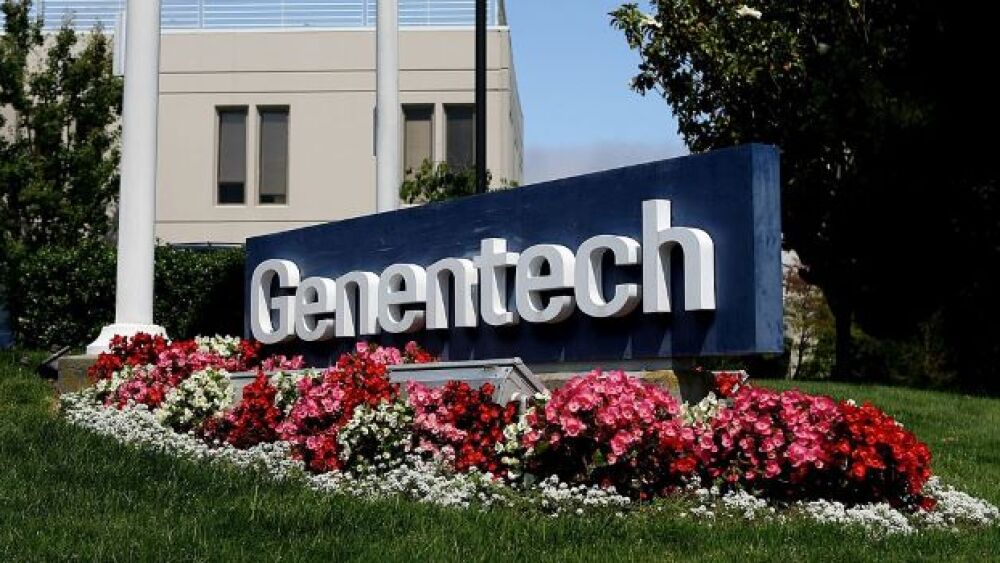Genentech and privately-held Arsenal Biosciences forged a multi-year collaboration to identify critical success circuits in T cell-based therapies for solid tumors.
Justin Sullivan/Getty Images
Genentech and privately-held Arsenal Biosciences forged a multi-year collaboration to identify critical success circuits in T cell-based therapies for solid tumors.
So far, T cell therapies, such as CAR-Ts, have been successful with hematological cancers but have fallen short with solid tumors. With a $70 million upfront payment, Genentech, a subsidiary of Roche, seeks to change that.
The Bay Area-based company will harness ArsenalBio’s proprietary technology for high-throughput screening and engineering of T cells with the aim of developing new approaches to treating solid tumors.
Beyond the upfront payment, ArsenalBio will be eligible for additional, undisclosed milestone payments.
ArsenalBio’s platform uses a suite of technologies, including high-throughput CRISPR-based gene editing, synthetic biology and computational biology. Together, these capabilities create what the company called “new synthetic biological programs” aimed at enhancing T cell functions to overcome immunological defense systems present associated with solid tumors.
Ken Drazan, chief executive officer of ArsenalBio, which launched in 2019, called the collaboration a testament to the strength of the company’s platform and its ability to identify the attributes of T cells that offer the most promise in addressing unmet needs in cancer. He told BioSpace that Genentech is leveraging ArsenalBio’s discovery and technology platforms to provide insights on how to design new cell products in their therapeutic areas of interest.
Drazen explained that the nature of solid tumors will require successful therapies that will overcome the hostile environment of solid tumors that block T cell entry. ArsenalBio’s approach offers prolonged trafficking of the T cell product to find the tumor alongside a persistence that retains anti-tumor activity in the patient for months after administration. He noted that ArsenalBio has specific synthetic gene functions engineered into its products that address these issues.
“Our company is structured to discover genome engineering and synthetic DNA components that address the performance gaps of cell therapy to improve clinical outcomes in solid tumor patients. We believe that our highly precise cell manufacturing approach creates a more homogeneous cell product, a safer product, a more persistent product, and a potentially higher therapeutic indexed product,” Drazen said.
The partnership with ArsenalBio will allow the company to access powerful technologies to advance the understanding of the biological programming of T cells, said James Sabry, global head of partnering with Roche.
For ArsenalBio, a San Francisco neighbor of Genentech, the partnership comes weeks after the company secured $220 million in a Series B financing round. Those proceeds are earmarked for the expansion of the company’s programmable cell therapy research activities. Additionally, the funds will be used to expand ArsenalBio’s pipeline of therapeutics for solid tumors.
ArsenalBio’s lead program is AB-1015, a potential therapeutic for ovarian cancer. AB-1015 received clearance from the FDA earlier this year for a Phase I trial. Dosing of the first patient is expected later this year.
The financing round was backed by Bristol Myers Squibb, Softbank Vision Fund 2, Hitachi Ventures and others. Previously, ArsenalBio received backing from the Parker Institute for Cancer Immunotherapy and the University of California at San Francisco Foundation Investment Company.
Earlier this year, ArsenalBio expanded a 2020 T cell collaboration with BMS focused on solid tumors. Similar to the Genentech partnership, ArsenalBio is discovering and developing preclinical candidates against multiple solid tumor targets.





